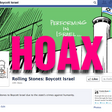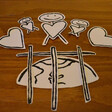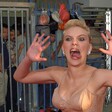Arts and Culture 18 February 2014
Update
The film embedded above was accidentally available to the public. The filmmaker Danielle Schwartz will make the film available online later this year after she has exhibited it at other film festivals, which demand exclusive exhibition rights. In the meantime, please check out Schwartz’s other work on Vimeo. Festivals who want to preview or exhibit Mirror Image should send her a message through Vimeo.
Original post
In her short film Mirror Image, Israeli filmmaker Danielle Schwartz and her grandparents “negotiate the words to tell the untold history” of a large mirror in their home but also of the Nakba. Schwartz created the film for the International Film Festival on Nakba and Return organized by Zochrot in November 2013.
The film beings with brief shots of a bucolic garden and a tidy home filled with memories and artifacts
Aside from the Israeli flag bunting and other details, this home might remind anyone of their own grandparents’ home.
Schwartz sits with her grandparents at the kitchen table and begins to read the brief story she has written about the mirror, which is known to have been previously owned by a Palestinian household.
When Schwartz describes the Zionist settlement where her grandfather was born in 1931 near “the Palestinian village of Zarnuqa,” her grandmother interrupts, “In those days we wouldn’t say ‘Palestinian,’ we’d say ‘Arab’ village.”
Schwartz’s grandmother is more comfortable discussing the past than her husband who displaces his own anxiety on to Schwartz.
Often the grandmother’s interventions in the discussion serve to elaborate or explain the unspoken but palpable feelings of her husband Yossi about the past.
When they begin to discuss the history of the mirror itself, the conversation becomes tense and her grandfather resists.
“What does that have to do with it?” asks Yossi when Schwartz tells that Zarnuqa was conquered by the Givati Brigade in May 1948.
Grandmother assures everyone at the table that “it’s written in history books… it’s nothing to worry about.”
However, Schwartz’s telling of the story is continuously interrupted by disputes over word choice. Was Zarnuqa “conquered?” Is the mirror “plundered” or merely “taken?”
“That’s what happened to the mirror, not to us.”
Schwartz wants to tell an honest and accurate story, but it has to be one that her grandparents can also recognize and identify with.
It is not a topic Schwartz’s grandparents would probably ever discuss if it weren’t for their granddaughter’s insistence.
“It’s clear that we’re only doing this for you. It’s clear… No doubt. We’re going along with things that maybe we wouldn’t do otherwise,” Schwartz’s grandmother reminds her.
“I hope it’s because you love me but also because you trust me and know that I love you,” Schwartz responds.
“Nevertheless, there are things that are still hard for us, and even though we trust you, there are things with which we don’t trust you,” her grandmother replies.
It is easy to identify with this family dynamic.
Just as Palestinian youth draw out the heavy and shuttered personal stories of the Nakba from their elders, Schwartz is of a new generation of Israeli Jews who challenge the dominant Zionist narrative by pressing her own grandparents for a more honest version of their story.




